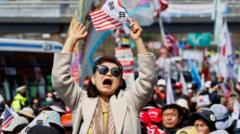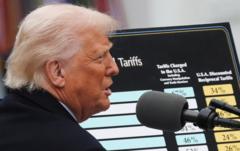The Constitutional Court's ruling affects Yoon's presidency and reignites debates about governmental powers and citizen rights.
# Yoon Suk Yeol's Impeachment Upheld by South Korea's Constitutional Court

# Yoon Suk Yeol's Impeachment Upheld by South Korea's Constitutional Court
South Korea's political landscape shifts dramatically as Yoon Suk Yeol is ousted following a controversial martial law declaration.
April 4, 2025, marks a critical juncture in South Korean politics as the Constitutional Court confirmed the impeachment of President Yoon Suk Yeol, resulting in his immediate removal from office. The court's decision came just four months after Yoon's alarming declaration of martial law on December 3, which was swiftly overturned by legislators within hours.
Amidst the court's announcement, vibrant protests unfolded across Seoul, with jubilant citizens expressing their relief and joy at Yoon's departure. Thousands had taken to the streets in recent weeks, demanding accountability from their leader, often braving harsh weather conditions. When Acting Chief Justice Moon Hyungbae revealed the court's unanimous decision to remove Yoon, it was deemed a significant blow to the former leader, who was accused of breaching public trust and violating legal norms.
The court highlighted that Yoon's imposition of martial law failed to justify its necessity in a national crisis, countering Yoon's claims during his brief tenure. His unexpected use of military force shocked lawmakers and citizens alike, triggering swift protests that emphasized the importance of democratic process and transparency.
Yoon's party, the People Power Party, released a statement acknowledging the court's verdict "humbly," paving the way for discussions on South Korea's political stability and the future of its leadership. As political fervor continues in the nation, the eyes of the world remain focused on South Korea's next steps in this evolving narrative of governance.
Amidst the court's announcement, vibrant protests unfolded across Seoul, with jubilant citizens expressing their relief and joy at Yoon's departure. Thousands had taken to the streets in recent weeks, demanding accountability from their leader, often braving harsh weather conditions. When Acting Chief Justice Moon Hyungbae revealed the court's unanimous decision to remove Yoon, it was deemed a significant blow to the former leader, who was accused of breaching public trust and violating legal norms.
The court highlighted that Yoon's imposition of martial law failed to justify its necessity in a national crisis, countering Yoon's claims during his brief tenure. His unexpected use of military force shocked lawmakers and citizens alike, triggering swift protests that emphasized the importance of democratic process and transparency.
Yoon's party, the People Power Party, released a statement acknowledging the court's verdict "humbly," paving the way for discussions on South Korea's political stability and the future of its leadership. As political fervor continues in the nation, the eyes of the world remain focused on South Korea's next steps in this evolving narrative of governance.



















